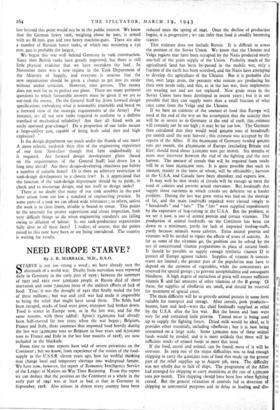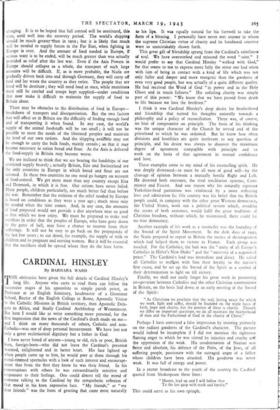NEED EUROPE STARVE ?
By J. R. MARRACK, D.S.O.
From time to time reports have told of severe privations on the Continent ; but we know, from experience of the stories of the food- supply in the U.S.S.R. eleven years ago, how far wishful thinking may change local and temporary shortage into widespread famine. We have now, however, the report of Economic Intelligence Service of the League of Nations on War Time Rationing. From this report we can deduce that the position on the Continent as a whole in the early part of 1942 was at least as bad as that in Germany in September, 1918. Also rations in almost every country have been reduced since the spring of 1941. Once the decline of production begins, it is progressive ; we can infer that food is steadily becoming scarcer.
This estimate does not include Russia. It is difficult to assess the position of the Soviet Union. We know that the Ukraine and Volga regions that have been occupied by the Nazis produced nearly one-half of the grain supply of the Union. Probably much of the agricultural land has been by-passed in the mobile war, only a fraction of the earth has been scorched, and the Nazis have attempted to develop the agriculture of the Ukraine. But it is probable also that, over large areas, the peasants who remain are producing for their own needs only, and that, as in the last war, their implements are wearing out and are not replaced. New grain areas in the Soviet Union have been developed in recent years ; but it is not possible that they can supply more than a small fraction of what once came from the Volga and the Ukraine.
If we base an estimate of the amount of food that Europe will need at the end of the war on the assumption that the scarcity then will be a's severe as in Germany at the end of 1918, this estimate will certainly not be too high ; it may be far too low. The Germans then calculated that they would need 400,000 tons of breadstuffs per month until the next harvest ; this estimate was accepted by the experts of the Allies. If the 60,000,000 of Germany needed 400,000 tons per month, the 47o,00o,000 of Europe (excluding Britain and Eire) should need about 3,100,000 tons per month. Six months or more may intervene between the end of the fighting and the next harvest. The amount of cereals that will be_ required from stocks will be at least 20,0004)00 tons. It is quite possible that such an amount, mainly in the form of wheat, will be obtainable ; harvests in the U.S.A. and Canada have been abundant and exports low.
It may well be that stocks of cereals will be enough to meet the need of calories and prevent actual starvation. But foodstuffs that supply those nutrients in which cereals are deficient set a harder problem. During the last war great stress was laid on the shortage of fat, and the main foodstuffs required were classed simply as " breadstuffs" and " fats." The " fats" were supplied expeditiously by the expansion of hog-raising in the U.S.A. But the problem, as we see it now, is one of animal protein and certain vitamins. The production of animal foodstuffs on the Continent has been cut down to a minimum, partly for lack of imported feeding-stuffs, partly because animals waste calories. Extra animal protein and vitamins will be needed to repair the effects of years of scarcity. As far as some of the vitamins go, the problem can be solved by the use of concentrated vitamin preparations in place of natural foods. It should be possible to supply enough synthetic vitamin D to protect all Europe against rickets. Supplies of vitamin A concen- trates are limited ; the greater part of the population may have to depend on the carotene of vegetables, while the concentrates are reserved for special groups ; to prevent xerophthalmia and consequent blindness. A high degree of extraction of grain will ensure sufficient vitamin B. and fair amounts of other vitamins of the B group. Of these, the supplies of riboflavin are small, and should be reserved for treatment of special cases.
The main difficulty will be to provide animal protein in some form suitable for transport and storage. After cereals, pork products— bacons, ham and lard—were the chief foodstuffs supplied as relief by the U.S.A. after the last war. But the bacon and ham were very fat and contained little protein. Tinned meat is being used up to supply the fighting forces. Dried milk would be ideal, as it provides other essentials, including riboflavin ; but it is now being consumed on a large scale. Some 3,000,000 tons of these animal foods would be needed, and it is most unlikely that there will be sufficient stocks of animal foods to meet this need.
If the food, cereal and animal, can be found, most of it will be overseas. In 1919 one of the major difficulties was to find enough shipping to carry the 4,000,000 tons of food that made up the greater part of the relief supplies up to August sth, 1919. The difficulty was not wholly due to lack of ships. The programme of the Allies had arranged for shipping to carry munitions at the rate of r,soopoo tons per month. This shipping should have been free when fighting ceased. But the general relaxation of controls led to diversion of shipping to unessential purposes and to delay in loading and tffs-
charging. It is to be hoped that full control will be continued, this time, until well into the recovery period. The world's shipping should be much greater-than in 1919; but it is likely that much will be needed to supply forces in the Far East, when fighting in Europe is over. And the amount of food needed in Europe, if serious want is to be ended, will be much greater than was actually provided as relief after the last war. Even if the Axis Powers in Europe should collapse as a whole, the transport of such large amounts will be difficult. If, as is more probable, the Naiis are gradually driven back into and through Germany, they will carry off food and lay waste the country as they retire. The people that are freed will be destitute ; they will need food at once, while munitions must still be carried and troops kept supplied—under conditions that now make it difficult to maintain the supply of food to Britain alone.
There may be obstacles to the distribution of food in Europe— breakdown of transport and disorganisation. But the two factors that will affect us in Britain are the difficulty of finding enough food and of transporting it when found. In any case, the world's supply of the animal foodstuffs will be too small ; it will not be possible to meet the needs of the liberated peoples and maintain the level of our own rations. And the shipping available may not be enough to carry the bulk foods, mainly cereals ; so that it may become necessary to ration bread and flour. As the Axis is defeated the food-supply in Britain may become worse.
We are inclined to think that we are bearing the hardships of our restricted supply bravely ; actually Britain, Eire and Switzerland are the only countries in Europe in which bread and flour are not rationed. In these two countries no one need go hungry on account of food-control. We get more meat than any country except Eire and Denmark, in which it is free. Our rations have never failed. Many people, children particularly, are much better fed than before the war. Remember that the estimate of the relief needed by Europe is based on conditions as they were a year ago ; much more may be needed when the time comes. And, in any case, the amounts of food proposed would not provide a diet anywhere near so good as that which we now enjoy. We must be prepared to make real sacrifices in order that the peoples of Europe, who have gone down to the gates of hell, may have a chance to recover from their sufferings. It will not be easy to. go back on the propaganda of the last few years ; to cut down, for example, the supply of milk to children and to pregnant and nursing women. But it will be essential that the sacrifices shall be spread where they do the least harm.



























 Previous page
Previous page